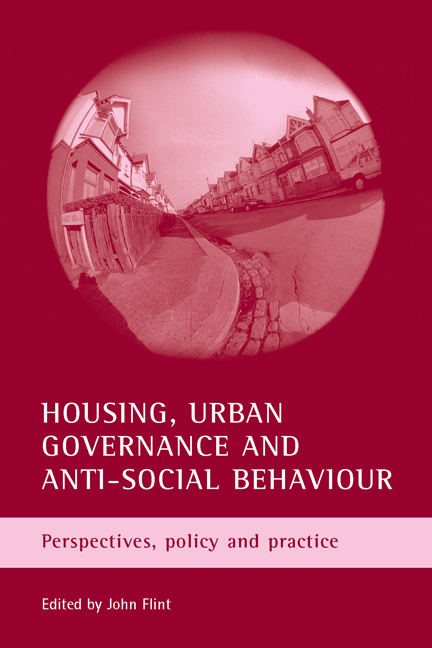Book contents
- Frontmatter
- Contents
- List of tables, figures and photographs
- Acknowledgements
- Notes on contributors
- Introduction
- Part 1 The definition and construction of anti-social behaviour in the UK
- Part 2 Legal techniques and measures utilised by social landlords to address anti-social behaviour
- Part 3 The emerging mechanisms of addressing anti-social behaviour in housing governance
- Part 4 Studies of housing and anti-social behaviour from an international perspective
- Index
Introduction
Published online by Cambridge University Press: 15 January 2022
- Frontmatter
- Contents
- List of tables, figures and photographs
- Acknowledgements
- Notes on contributors
- Introduction
- Part 1 The definition and construction of anti-social behaviour in the UK
- Part 2 Legal techniques and measures utilised by social landlords to address anti-social behaviour
- Part 3 The emerging mechanisms of addressing anti-social behaviour in housing governance
- Part 4 Studies of housing and anti-social behaviour from an international perspective
- Index
Summary
On the morning after New Labour's re-election in the UK in 2005, Prime Minister Tony Blair set out the government's priorities. In his speech he said:
I’ve been struck again and again in the course of this campaign by people's worry that in our country … there is a disrespect that people don't like. And whether it's in the classroom or on the street, or our town centres on a Friday or Saturday night, I want to focus on this issue. We’ve done a lot so far with anti-social behaviour and increased numbers of police, but I want to make this a particular priority for this government – how we bring back a proper sense of respect in our schools, in our communities, in our towns, in our villages. (Blair speech, 6 May 2005)
Blair was correct to state that since 1997 ‘a lot has been done’ with anti-social behaviour (ASB), if this is taken to mean the political priority given to the issue in rhetoric, discourse, legislation and policy development. Tackling ASB is now embedded in a new organisational architecture of governance at central and local government, and increasingly community and neighbourhood, levels. In 2003 an Antisocial Behaviour Unit (ASBU) was established (in the Home Office) within the traditional crime and policing remit of the Home Office along with a new Respect Task Force (see www.respect.gov.uk). Local authorities in the UK have been given enhanced powers and responsibilities and encouraged, through Crime and Disorder Reduction Partnerships (CDRPs), to prioritise tackling ASB. In Scotland local authorities are required to develop anti-social behaviour strategies and are encouraged to establish ASBUs (Scottish Executive, 2003). The Home Office-led TOGETHER campaign and action plan (a resource for practitioners working to tackle ASB across England and Wales: see www.together.gov.uk) has maintained the high profile given to tackling ASB, translated into action through funding and intervention in 50 communities designated as TOGETHER Action Areas. Increasing emphasis is given to strengthening neighbourhood tiers of governance and incorporating citizens and communities as part of the wider policing family coupled with policing reforms aimed at delivering neighbourhood policing (Home Office, 2004). This governmental focus on ASB is also reflected in, and influenced by, the increased profile given to the issue by professional groupings and agencies, for example the Social Landlords Crime and Nuisance Group.
- Type
- Chapter
- Information
- Housing, Urban Governance and Anti-Social BehaviourPerspectives, Policy and Practice, pp. 1 - 16Publisher: Bristol University PressPrint publication year: 2006



